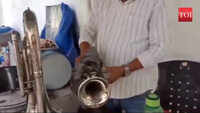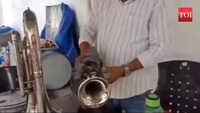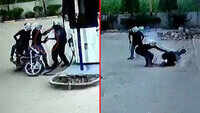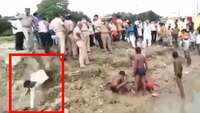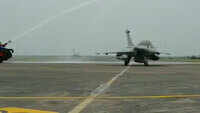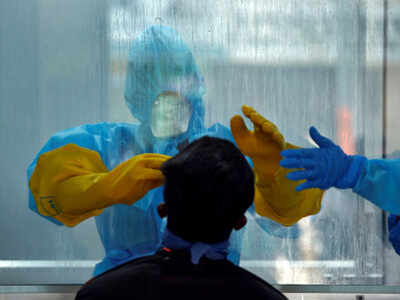
CHANDIGARH: Two more private laboratories were authorised to conduct Covid-19 tests —RTPCR capped at Rs 2,000 and antibody charged between Rs 1,000 and Rs 1,350, which does not detect the virus but only determines if there are antibodies after an infection.
Private laboratories are coming up with health safety packages for corporates keen to restart offices and know if an employee has developed antibodies against the virus or not. “This is not a test to detect Covid. It is mainly to understand prevalence of the virus in an area. Those who had the infection develop antibodies against the virus which are not necessarily protective,” said a health activist.
The first laboratory to start the test was SRL in Sector 11. The other two are Metropolis and Atulya, both again in Sector 11. Metropolis has to start the tests while the rest have drive-through facilities. “The tests need doctors’ prescription and photo ID of the patient. The reports are sent online the next day,” said sales manager of one of the diagnostic centres.
Besides, PGI which has been evaluating some Indian-made antigen kits for Covid, has found a Kerala-based firm’s kit to pick up only 5% cases. The same has been disapproved for usage and a report submitted to the ICMR.
Presently, another Chinese antigen kit is under evaluation. Moreover, as only one kit has been validated so far by the ICMR for antigen testing, PGI will evaluate it and test which set of patients it works best for. For the Kerala based firm’s kit, PGI had 100 RTPCR positive samples and 100 SARI (symptomatic) patients samples. The results of RTPCR were compared to the reports of the antigen test. “We did 90 positives as the virus pick up rate was 5%. So, we did not go for negative samples and have disapproved it,” said Prof Mini P Singh, department of virology, PGI.
The kit manufactured by South Korean firm, SD Biosensor, has sensitivity between 50% and 80%. It is the only point of care antigen testing kit — a test which is outside the laboratory that takes 15 minutes to 30 minutes for reporting — which is approved till date.
“We will start evaluation in PGI. The kit has been ordered. We want to know how the antigen test performs in different sets of people and in which set of patients, presurgical or contacts, it works the best. If the OPD has to start, this test is feasible as it will save resources,” said Prof Singh.
As per the ICMR guidelines, the antigen test is for diagnosing people with influenza-like illnesses and asymptomatic contacts of patients in Covid-19 containment zones. It is also for symptomatic and asymptomatic people in all healthcare facilities. Also, those who get negative results on the rapid antigen kit must be confirmed using RT-PCR, while those who get positive results needn’t get a retest. “The problem is with false negativity with this kind of testing. But for containment areas and situations where the positivity rate is high, this test is appropriate. When there are many contacts in a household and have to be quarantined, it is also practical to test them with this diagnostics,” said Prof Singh. Presently, only RTPCR is being used in Chandigarh to diagnose Covid-19.
Private laboratories are coming up with health safety packages for corporates keen to restart offices and know if an employee has developed antibodies against the virus or not. “This is not a test to detect Covid. It is mainly to understand prevalence of the virus in an area. Those who had the infection develop antibodies against the virus which are not necessarily protective,” said a health activist.
The first laboratory to start the test was SRL in Sector 11. The other two are Metropolis and Atulya, both again in Sector 11. Metropolis has to start the tests while the rest have drive-through facilities. “The tests need doctors’ prescription and photo ID of the patient. The reports are sent online the next day,” said sales manager of one of the diagnostic centres.
Besides, PGI which has been evaluating some Indian-made antigen kits for Covid, has found a Kerala-based firm’s kit to pick up only 5% cases. The same has been disapproved for usage and a report submitted to the ICMR.
Presently, another Chinese antigen kit is under evaluation. Moreover, as only one kit has been validated so far by the ICMR for antigen testing, PGI will evaluate it and test which set of patients it works best for. For the Kerala based firm’s kit, PGI had 100 RTPCR positive samples and 100 SARI (symptomatic) patients samples. The results of RTPCR were compared to the reports of the antigen test. “We did 90 positives as the virus pick up rate was 5%. So, we did not go for negative samples and have disapproved it,” said Prof Mini P Singh, department of virology, PGI.
The kit manufactured by South Korean firm, SD Biosensor, has sensitivity between 50% and 80%. It is the only point of care antigen testing kit — a test which is outside the laboratory that takes 15 minutes to 30 minutes for reporting — which is approved till date.
“We will start evaluation in PGI. The kit has been ordered. We want to know how the antigen test performs in different sets of people and in which set of patients, presurgical or contacts, it works the best. If the OPD has to start, this test is feasible as it will save resources,” said Prof Singh.
As per the ICMR guidelines, the antigen test is for diagnosing people with influenza-like illnesses and asymptomatic contacts of patients in Covid-19 containment zones. It is also for symptomatic and asymptomatic people in all healthcare facilities. Also, those who get negative results on the rapid antigen kit must be confirmed using RT-PCR, while those who get positive results needn’t get a retest. “The problem is with false negativity with this kind of testing. But for containment areas and situations where the positivity rate is high, this test is appropriate. When there are many contacts in a household and have to be quarantined, it is also practical to test them with this diagnostics,” said Prof Singh. Presently, only RTPCR is being used in Chandigarh to diagnose Covid-19.

Coronavirus outbreak
Trending Topics
LATEST VIDEOS
More from TOI
Navbharat Times
Featured Today in Travel
Quick Links
Kerala Coronavirus Helpline NumberHaryana Coronavirus Helpline NumberUP Coronavirus Helpline NumberBareilly NewsBhopal NewsCoronavirus in DelhiCoronavirus in HyderabadCoronavirus in IndiaCoronavirus symptomsCoronavirusRajasthan Coronavirus Helpline NumberAditya ThackerayShiv SenaFire in MumbaiAP Coronavirus Helpline NumberArvind KejriwalJammu Kashmir Coronavirus Helpline NumberSrinagar encounter
Get the app
